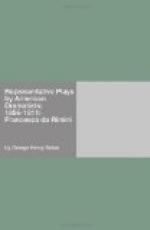Silvio Pellico, who wrote the first drama on “Francesca da Rimini” known to modern playgoers, lived his early life in an intensely religious atmosphere, and suffered imprisonment later because of his patriotic tendencies; it is not surprising, therefore, to find in his play—first a national appeal that was to win it applause from all Italy, and then, more important still, a purity of tone that struggled most nobly against an inevitable, passionate end. Paolo is the one who, after some scruples, succumbs; Francesca is infinitely conscious that she is a wife; Giovanni is suspicious. It would seem that Pellico’s play is the first that realized the theatrical possibilities of the story; research has brought to light no play manuscript previous to his.
In the handling of his details, Pellico’s incongruities and artificialities are many. Paolo returns from knightly deeds in Asia, to find his father dead—the Malatesta Verucchio who died in 1312, twenty-seven years after Giovanni committed the murder; therefore Pellico gives to the deformed brother the power that history does not wholly accord. The dramatist would avoid the indelicacy he finds in the reading incident, recounting it only in a situation during which Francesca holds aloof in a wild effort to stifle her love. Throughout the play, there is this ruthless twisting, in a desire to conceal wrong and unpardonable sin.
Turning to Uhland’s fragmentary ideas, which even he himself was doubtful whether he could handle, an atmosphere confronts us as mediaevally German as the “Der arme Heinrich” of Hartmann von Aue, which was the inspirational source for Longfellow’s “The Golden Legend.” Uhland shows heaviness in conception, and a conventionality, thoroughly at variance with the tragedy’s original passion. Romantic as he is, he has robbed the story of its warm southern nature, and has thrown his Dante aside to deal with false situation. He seems willing to let fact and spirit go. Paolo is a knight who tilts and worships a glove. Uhland thinks, and he is not alone in his belief, that Francesca had been promised to Paolo before Giovanni was wedded to her; yet if Paolo’s marriage with Orabile, in 1269, is to be recognized as correct, historically, logical deductions from dates would discountenance the statement. Neither have I found commentaries to support the theory that Paolo was older than Giovanni, as Uhland sets forth in his play. The servant in Boccaccio here becomes a jealous lover. It is interesting to note the variations of this counter-element in the many play versions of the story—the element that urges Giovanni’s suspicion to quick action—the dramatic force of Pepe in Boker; the disappointed motherhood and embittered love of Lucrezia in Stephen Phillips; the inborn savagery of Malatestino in D’Annunzio; the innocent unconsciousness of Concordia in Crawford, which finds similarity in a scene in Maeterlinck’s “Pelleas and Melisande” between father and little son. Further, in Uhland, a distorted glimpse of a colourless reportorial figure of Dante, gathering material for his poem, is as meaningless as it is unnecessary for atmosphere.




